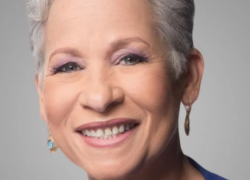
By Keile Campbell
Journal Staff Writer
The results of the 2023 Bahamas Junior Certificate (BJC) and Bahamas General Certificate of
Secondary Education (BGCSE) national examinations have been released and despite
improvements in some areas, only 10.9 percent of Bahamian students who took the BGCSE
exams got a ‘C’ grade or above in five subjects, while only 5.62 percent received a ‘C’ grade
or above in critical subjects such as Math, English and Sciences.
This was revealed during a press conference on Wednesday held by the Ministry of Education
and Technical and Vocational Training and the statistical data of results was released.
According to Education Minister Glenys Hanna-Martin, the examination performance
showed the direct effects of the learning loss due to the COVID-19 pandemic which was
compounded by long-standing issues with the education system.
“Yes, it is very concerning, and it would be interesting to see what the performance has been
in the last 10 years, 15 years. Only a percentage attain these BGCSEs,” Minister Hanna-
Martin explained.
“We have had ongoing issues and signals about performance in our schools. What is different
this time, I believe, is that we have determined to go to the fundamentals of learning at
preprimary, primary, the interventions at junior high, at senior high. So, if you have a student
at grade 10 and he did BJCs and didn’t get it, we will do interventions with that student if
there are literacy issues, he might be special ed, we don’t know. And so, what we are doing
now is bringing a significant and specific eye to individual student performance.”
Minister Hanna-Martin explained that the purpose for the learning loss assessment testing and
the collaboration with Renaissance Learning was to see the status and severity of learning
loss of every student at every level in the public sector.
She expanded on what is being done to a matter that she has commonly referred to as a
“crisis.”
“What we seek to do now is to intervene. So, where there’s a learning loss issue, which is a
phenomenon, then we will seek to close that gap. Sometimes the gaps are just historic passing
[a student] through the system. And that’s happened a lot in education. So, we want to put a
stop to that. We don’t want a 17-year-old leaving school and saying, ‘I can hardly read,’”
Minister Hanna-Martin said.
“We are intervening at every step of the way, to ensure as best we can. It’s a Herculean task
what’s ahead of us. It’s huge, because we have historic educational deficiencies and now the
learning loss issue. So it’s huge, but we have committed, we will put the resources there, the
charge has been given to teachers, we’ve brought in special ed teachers for the remediation.”
She also revealed that not every student is going to be academically-inclined, but that is not a
negative indictment on them.
“Not every child in this is going to get a BGCSE in physics, or we’d like them to get least get
English and Maths, but not every child is what we may call ‘academic’ in that way,” Minister
Hanna-Martin said.
“So, what we seek to do is to find the talents and strengths of that child to ensure that they are
given the appropriate training and certifications. So, they can go out into the workplace and
probably make plenty, plenty money, because they do, but they’re able to realize their
potential and their gifts and their talents.”
Data revealed by Acting Director of Education Dominique McCartney-Russell showed, far as
Bahamian students who took BJCs and students who took BGCSEs, levels are returning to
what they were pre-pandemic, with 39,954 candidates awarded BJC grades, an increase of
12.85 percent from last year.
The number is short, however, of 2019 when 40,701 grades were awarded.
With regard to BGCSE, the case was the same in that though gradually the education system
is returning to pre-Covid levels, with 18,716 candidates awarded grades, this is a 6.59 percent
increase from 2022 when 17,559 candidates were awarded BGCSE grades, however, falls
greatly short of 23,810 grades awarded in 2019.


